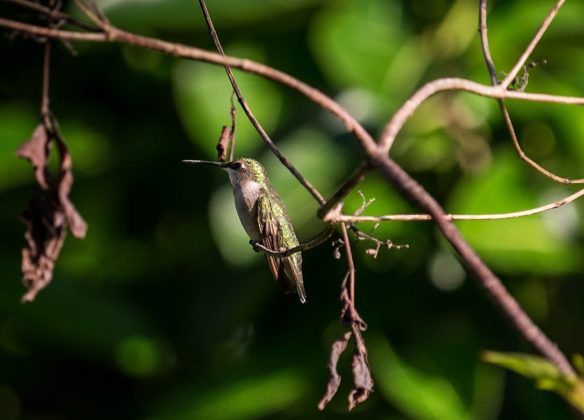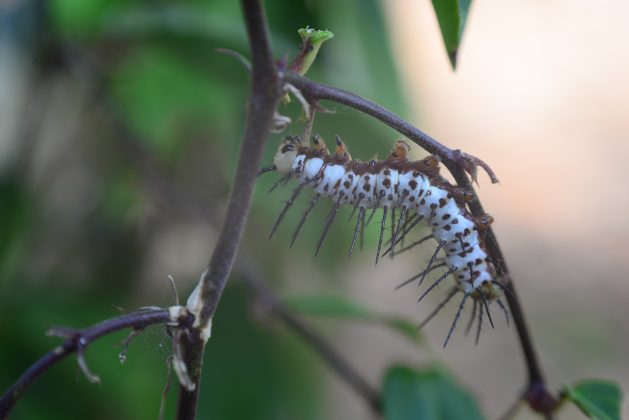|
Getting your Trinity Audio player ready...
|
Deering Estate is proud to be part of Miami-Dade County’s efforts to support our native pollinators. Pollinators are essential to our lives, 75% of the world’s flowering plants and 35% of the world’s crops rely on pollinators. What that means is a lot of the food found in your local supermarket needed a pollinator. Now more than ever we all need to play an active role in supporting our pollinators as they are facing significant threats. A 2017 report by the Center of Biological Diversity found that 25% of native bee species are imperiled in the United States and worldwide more than 50% of native bee species are in decline. That is why Miami-Dade County Parks, Recreation and Open Spaces and Deering Estate are leading the effort to increase native pollinator habitat in urban green spaces and educate the public that they can do the same at home.
Importance of supporting native pollinators
First a little bit of science! Pollinators are any animal that move pollen from the male part of a flower to the female part effectively leading to reproduction. The major pollinators you may have heard of are bees and butterflies but bats, birds and even flies are important pollinators that need to be supported. One fantastic example at the Deering Estate is the ruby-throated hummingbird that loves to hang around our Firebush along 72nd Ave. You can plant native Firebush and other native nectar plants such as Coral honeysuckle, Red buckeye, Coralbean, and Trumpet creeper to attract this beautiful hummingbird into your lawn areas. In South Florida we want to make sure we are conserving native pollinators more than anything as they have evolved the most effective relationship with native plants. With more native plant reproduction we will have stronger, more resilient ecosystems that can withstand potentially damaging events like hurricanes. Other benefits from planting native pollinator supporting species include improve water quality by filtering storm water and runoff, reduce the heat island effect and since they are adapted to living in South Florida these plants are low maintenance and water-efficient.
Efforts to restore habitat for native pollinators
Deering Estate has participated in a multitude of efforts to restore habitat for native pollinators. In 2022 our staff hosted two Pollinator Workshops to teach the community about native pollinators proceeded by a citizen science survey on the main 12 acres in which over 42 species were recorded including butterflies, bees, flies, moths, and birds. We planted 30 torchwood reestablish the Schaus’ swallowtail and 10 Marsh’s Dutchman’s pipe host plant to the Polydamas swallowtail butterfly in 4 locations of the Deering Estate. During the summer of 2022, our team conducted butterfly tours with 64 community members total in attendance within a four-month span. We dedicated one week of summer camp at Deering to the theme of Pollinators, with 74 kids in attendance. And summer camp kids helped maintain one of our butterfly gardens, experienced a virtual reality butterfly game, participated in nature photography with a focus on identifying pollinators, hiked the Pine Rocklands looking for coontie which is the native host plant to the Atala Butterfly, and made butterfly feeders. Throughout the school year our team conducted 60 K-12 STEM+ Arts Learning Programs which included pollinator messaging, serving 575 participants.
Current and future projects
In 2023 as parts of the Parks for Pollinators initiative we have commenced our Propagation Station and Native Pollinator Nursery Area inside of the estate. This will serve as both as an exhibit on native pollinator plants, an educational area to conduct botanical workshops and field trips, and as an outdoor laboratory to experiment techniques on propagation and growth with our research interns. We hope to grow over 40 species of native pollinator plants with a focus on the plants historically found in our natural areas.
Deering Estate is hosting and participating in programs and events for our community to learn and experience the magic of native pollinators. The NABA Butterfly Count is an ongoing program of NABA to census the butterflies of North America (United States, Canada and partially Mexico) and to publish the results. Volunteer participants select a count area with a 15-mile diameter and conduct a one-day census of all butterflies sighted within that circle. The Coral Gables North American Butterfly Association (NABA) Butterfly Count is on Saturday, June 24th. Teams will cover Fairchild Tropical Botanic Garden, Deering Estate, Bill Baggs Cape Florida State Park, Coral Gables, and Virginia Key. Guided Butterfly Walks at Deering Estate are also scheduled for June 24, July 22, August 26 and September 23.
Park and Recreation Month is celebrated in July to promote building strong, vibrant and resilient communities through the power of parks. This year’s theme “Where Community Grows” celebrates the vital role park and recreation professionals play in bringing people together, providing essential services and fostering the growth of our communities. Make sure to check out our ‘Plant an Orchid, Save a Bee’ event on Saturday, July 15th where we will have Fairchild Tropical Botanic Garden botanists and UF/IFAS Extension Florida-Friendly Landscaping Program agents teaching you how to plant and care of native orchids and how to build your own pollinator hotel to take home! For more information, please visit the website.








